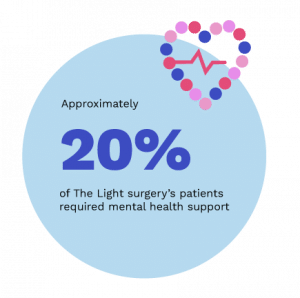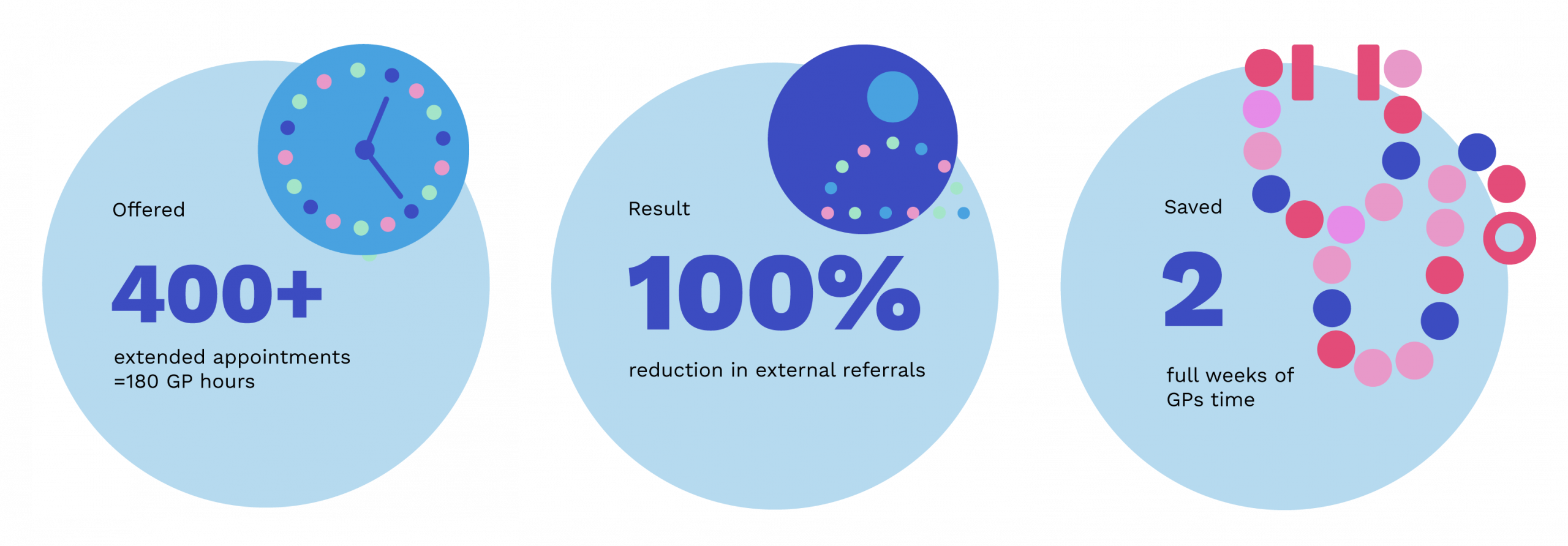The demand for mental health services in the UK is continuing to grow. Recent figures show that at any one time, 1 in 69 of the UK population aged between 16-64 have a mental health problem.

The Light Surgery, in the city centre of Leeds, noticed that nearly 20% of their patients required mental health support.
This is reflected in the Director of Public Health in Leeds report of 2017-18 which found there are twice as many women as men with common mental health disorders in Leeds, with it affecting over 80,000 women. It also found within Leeds, it is estimated that there are 16,000 young women aged 16–24 years suffering from common mental health problems at any one time. Due to growing demand for mental health services across the UK, and the subsequent pressure that brings, increased waiting times for patients accessing specialist care is a key factor which needs addressing.
In order to fulfil the city’s Health and Wellbeing Strategy goal, for Leeds to be the best city for health and wellbeing, The Light wanted to improve care services for people experiencing mental health problems. Taking this into consideration, the surgery was instrumental in developing a range of services.
Service Objectives
- Improve patient access and choices for mental health services
- Enable patients to understand, improve and self-manage their mental health
- Reduce GP time spent dealing with mental health issues
- Reduce the burden of workload for clinical staff
- Improve patient experience and outcomes.
Implementation and Development
The mental health support service delivers its offering across four Leeds sites, part of OneMedical Group: The Light Surgery, Wetherby Surgery, Shakespeare Medical Practice, and Westgate Surgery.
The service offers support, information, advice, and guided self-help for registered patients struggling with conditions such as anxiety, depression, OCD and low self-esteem. It has been developed to provide early intervention and improve patients’ wellbeing, preventing escalation or deterioration into a severe or enduring problem.
Whether the patient was self-referred or directed to the service by a health professional, the patient can receive the most appropriate care through the assistance of a mental health worker or emotional health practitioner. An initial assessment appointment identities areas of need and helps to determine a bespoke care plan for each individual.
Patients are then supported throughout their journey to reach their own goals and address emotional, psychological, practical and social barriers.
Designed to offer a wide scale of support for mental health issues, the service has a range of skilled practitioners who specialise in services such as support through alcohol and drug abuse, domestic violence, and talking therapies. Which can support from an initial discussion to help identify underlying issues, through to advice and support including signposting to voluntary service or onward referral to the community mental health teams.
The service supports patients towards their individual goals and address emotional, psychology, practical and social barriers in their lives. Its offering is three-fold:
- Working in partnership with Northpoint, a branch of IAPT services, to provide quicker access to a high-level specialist mental health service which is available four-days a week.
- In-house practitioner who operates across all sites. We recruited this role after a gap was identified for a mid-level service, between the high-level specialist and social prescribing options already available. This service is offered over a course of six weeks to ensure issues are identified and managed effectively.
- Social prescriber who supports the services by offering support in areas such as stress, grief and anxiety and can signpost patients to groups, activities and classes which may be better suited to the needs of the patients.
Outcomes
By incorporating this service in to a primary care setting, it tackles the stigma of accessing mainstream mental health services and removes barriers and restrictions which may prevent self-referrals. Thus, the service significantly improved the accessibility and overall care provided for patients.
By offering this service, we have:










